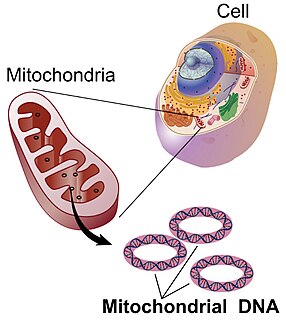
Mitochondrial DNA is the DNA located in mitochondria, cellular organelles within eukaryotic cells that convert chemical energy from food into a form that cells can use, such as adenosine triphosphate (ATP). Mitochondrial DNA is only a small portion of the DNA in a eukaryotic cell; most of the DNA can be found in the cell nucleus and, in plants and algae, also in plastids such as chloroplasts.
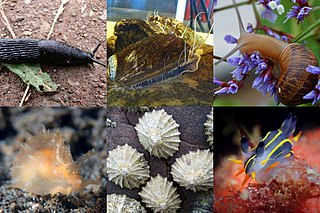
The gastropods, commonly known as snails and slugs, belong to a large taxonomic class of invertebrates within the phylum Mollusca called Gastropoda.
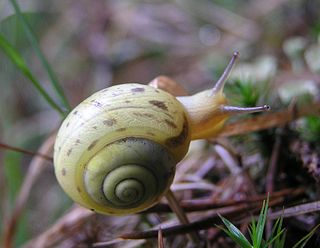
Bradybaeninae is a taxonomic subfamily of medium-sized to small land snails, terrestrial pulmonate gastropod mollusks in the family Camaenidae, superfamily Helicoidea.

Euhadra is a genus of air-breathing land snails, terrestrial pulmonate gastropod mollusks in the subfamily Bradybaeninae of the family Camaenidae.

Oreobates quixensis, also known as the common big-headed frog, is a species of frog in the family Strabomantidae. It is found in the upper Amazon Basin in Bolivia, western Brazil, Colombia, Ecuador, and Peru. It is a very common terrestrial frog of primary and secondary tropical moist forest, also to be found in clearings, open areas and banana groves.
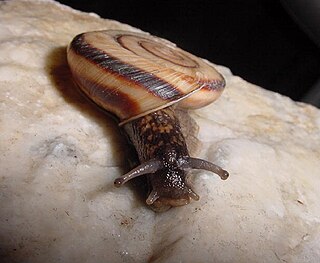
Euhadra murayamai is a species of air-breathing land snail, a terrestrial pulmonate gastropod mollusk in the family Bradybaenidae. This species is endemic to Japan.
Euhadra nachicola is a species of air-breathing land snail, a terrestrial pulmonate gastropod mollusk in the family Bradybaenidae. This species is endemic to Japan.
Euhadra sadoensis is a species of air-breathing land snail, a terrestrial pulmonate gastropod mollusk in the family Bradybaenidae. This species is found in Japan.

Mandarina is a genus of air-breathing land snail, a terrestrial pulmonate gastropod mollusk in the family Bradybaenidae.

Euhadra quaesita, common name, the sought-after false hadra, is a species of air-breathing land snail, a terrestrial pulmonate gastropod mollusc in the family Bradybaenidae. This species is found in Japan.
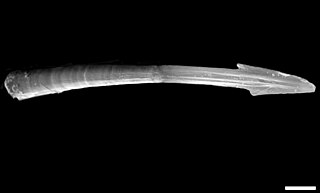
A love dart is a sharp, calcareous or chitinous dart which some hermaphroditic land snails and slugs create. Love darts are both formed and stored internally in a dart sac. These darts are made in sexually mature animals only, and are used as part of the sequence of events during courtship, before actual mating takes place. Darts are quite large compared to the size of the animal: in the case of the semi-slug genus Parmarion, the length of a dart can be up to one fifth that of the semi-slug's foot.

Euhadra senckenbergiana is a species of air-breathing land snail, a terrestrial pulmonate gastropod mollusk in the family Bradybaenidae. This species is found in Japan.
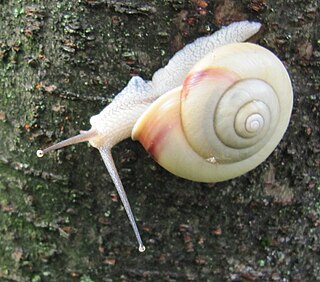
Euhadra amaliae is a species of air-breathing land snail, a terrestrial pulmonate gastropod mollusk in the family Bradybaenidae.
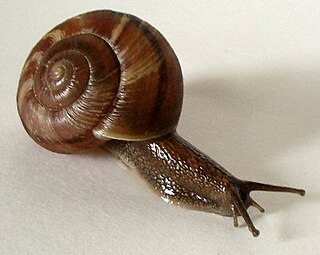
Euhadra sandai is a species of air-breathing land snail, a terrestrial pulmonate gastropod mollusk in the family Bradybaenidae.
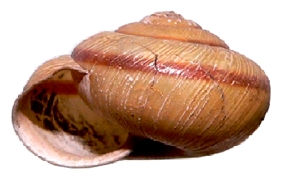
Euhadra decorata is a species of air-breathing land snail, a terrestrial pulmonate gastropod mollusk in the family Bradybaenidae. This species is found in Japan.

Platydemus manokwari, also known as the New Guinea flatworm, is a species of large predatory land flatworm.

Helix nucula is a species of air-breathing land snail, a terrestrial pulmonate gastropod mollusk in the family Helicidae, the typical snails. According to the malacologist E. Neubert, the taxonomy of this species is rather complex; the species has been confused with Helix figulina, a related species. Scientists who conducted a study using mitochondrial DNA sequences confirmed that H. nucula is a distinct monophyletic species, and within that clade are two lineages that were well distinguished, one from the North African population and the other from southwest Crete.

Pseudiberus zenonis is a species of land snail, a terrestrial pulmonate gastropod mollusc in the family Bradybaenidae.
Cytochrome P450, family 10, also known as CYP10, is a cytochrome P450 family found in Lophotrochozoa belongs to Mitochondrial clan CYPs, which is located in the inner membrane of mitochondria(IMM). The first gene identified in this family is the CYP10A1 from the Lymnaea stagnalis, which is highly expressed in the female gonadotropic hormone producing dorsal bodies.















